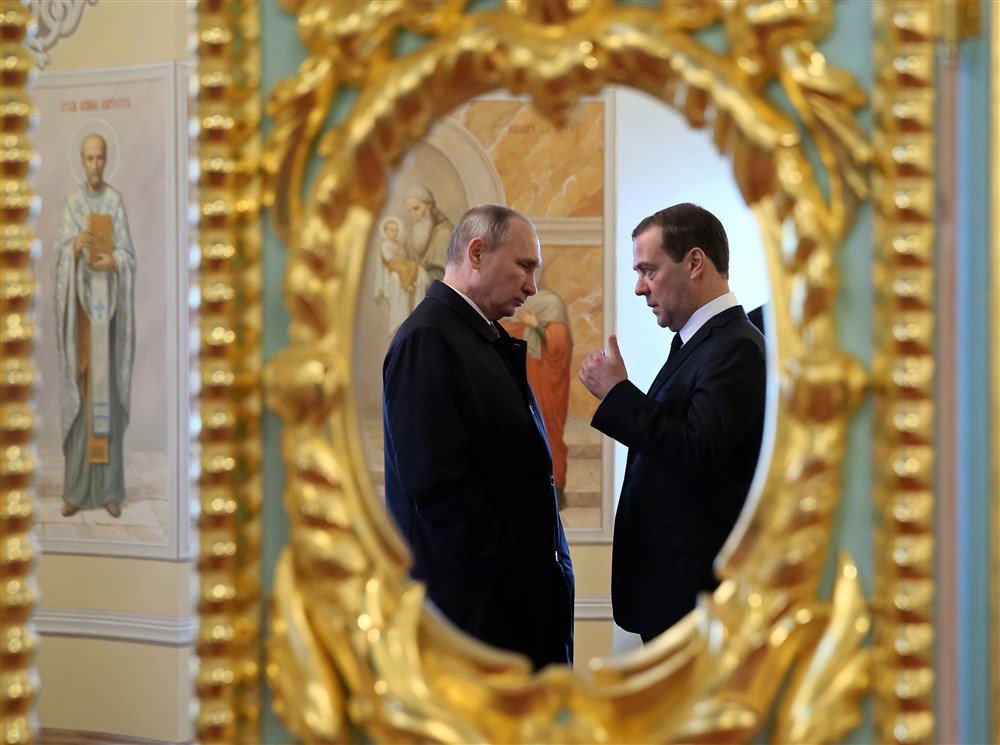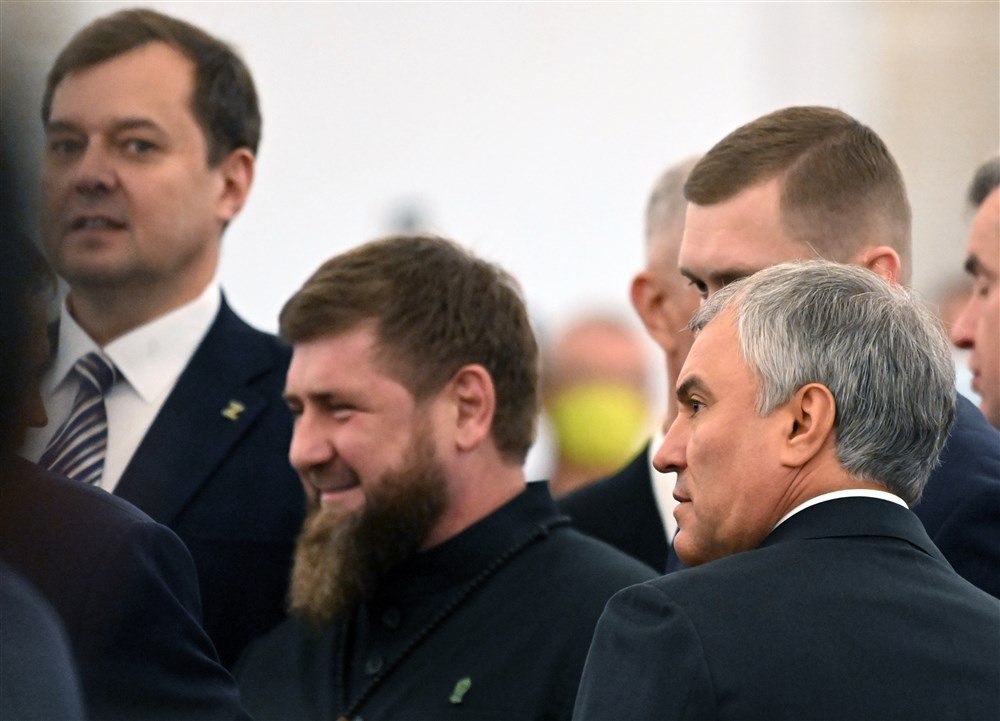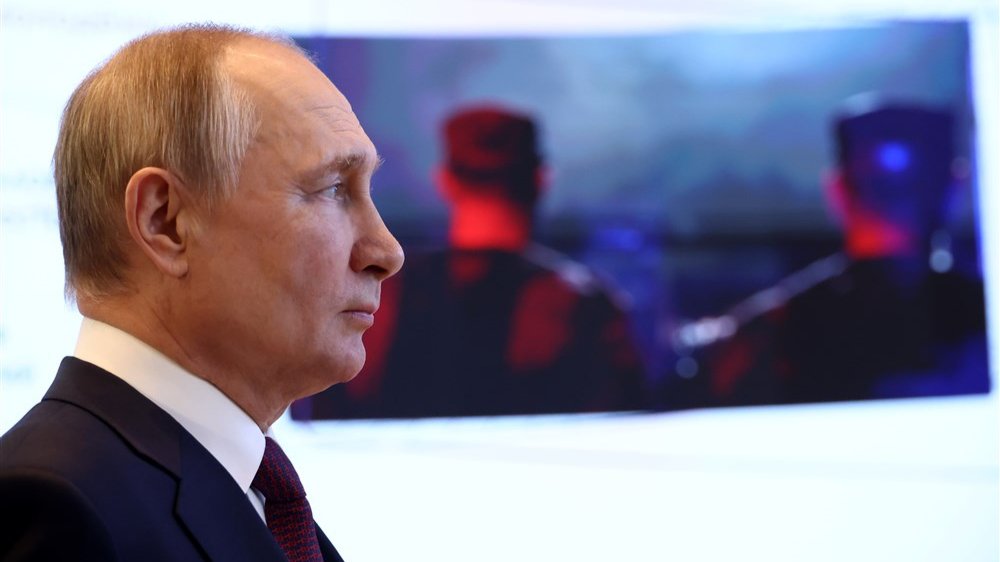The text was prepared based on a speech by Grigory Golosov at a conference titled “Russian realities 2022: politics, economics, civil society” organised by “About the country and world” Telegram channel with the support of the Andrei Sakharov Foundation and Memorial. Novaya Gazeta Europe thanks them for the opportunity to publish this text with slight changes.
From pragmatism to dictatorship
What happened in Russia on 24 February 2022 is very well illustrated by the idea voiced by classic authors that the worst evil in this world is trivial in its source. This tragedy indeed is rooted in the routine, in what the Russian political discourse sometimes brands as pragmatism.
What did Vladimir Putin want to achieve [by invading Ukraine]? He wanted a quick and victorious war, possibly not as casualty-free as in 2014 but similar in implementation. The “Polite People” (also referred to as “little green men”, the term used to describe masked Russian soldiers who participated in the occupation of Crimea — translator’s note), were meant to parade across Kyiv, while Russians were supposed to turn their TVs on to see that everything that Putin was doing was successful. This triumph would lead Vladimir Putin to another presidential election in 2024 on a high note.
This logic has nothing pathological in it, it is truly pragmatic and completely falls in line with everything that happens in countries whose political regimes are similar to the Russian one. This regime is called a personalist dictatorship. Its main problem is that the leader is slowly becoming more and more isolated from society and the ruling class and is sooner or later bound to make fatal mistakes. This is exactly what we saw on 24 February.
The modern world observes four main types of authoritarianism: monarchy, military regime, party regime, and personalist dictatorship. Let’s say a few words about why Russia does not qualify as the first three ones.
The monarchy option can be rejected straight away for obvious reasons (power in these regimes is normally inherited — editor’s note). Russia can only be described as a monarchy in a very metaphorical sense.
It is often speculated that Russia’s political regime is a dictatorship of the so-called siloviki (security and law enforcement officials — translator’s note) which would mean that the political regime falls under the military category. I believe it is wrong. Vladimir Putin indeed comes from the siloviki environment. We know his professional background. He ended this part of his career a long time ago, becoming a career politician in the early 1990s. He held on to some personal relationships from those times that he still values, some of his most trusted accomplices come from this environment. However, no siloviki faction rules Russia as a corporation.
If we take a closer look at the relations between Putin and various power structures in Russia, we will see that they are based on the same foundations that were laid in the 1990s under Boris Yeltsin (the first president of Russia — translator’s note). On the one hand, the top-tier siloviki officials are deeply incorporated into the ruling class in a way that they lose any strategic initiative and the need to take any action because the current status quo is generally convenient for them. On the other hand, and it was very clearly visible under Yeltsin and in Putin’s first years in power,
power structures are deeply fragmented, compete against and don’t trust each other, it is very difficult to coordinate their activities to advance one’s own agenda.
In other words, the power structures are controlled by the authoritarian leader.
Russia does not have a party regime either. [The ruling] United Russia serves as an electoral instrument and a legislative control tool, nothing more. Its role does not envision any independence in the Russian political regime. It is also crucial to remember because when opinions are put out there that Russia now has a fascist regime, [we need to understand] that this regime should not just be mobilising but also a party one.
No system of political mobilisation can be built without an organisation that would have many local branches. A political party most frequently plays this role in fascist regimes. However, the United Russia functions solely as a department of the state administration machinery.
Therefore, it is not just correct to classify the Russian political regime as a personalist dictatorship because it functions as one but also by process of elimination when analysing the types of authoritarian regimes in general.
Ways of degeneration
An important feature of Russia’s personalist dictatorship lies in its origins as a child of the imperfect electoral democracy of the 1990s. These regimes usually exhibit a different evolutionary trajectory and emerge as a result of degeneration of other authoritarian regimes.
A monarchy can lapse into a personalist dictatorship when a monarch becomes arbitrary in their rule. However, it is not normally like that: monarchs are rather limited in their actions and not omnipotent. Sometimes we see an occasional lunatic who thinks they are above all rules, but these monarchs normally end their lives in a very tragic manner. Monarchies have a rather high resistance level against this arbitrariness.
Military regimes downgrade into personalist dictatorships more often but when a certain top military brass contemplates the future of their actions, they should take into account that they are not the sole ruler. There are always others in command who have their own political resources and who can dislike the degradation taking place before their eyes.
Party regimes are viewed as the most organised and structured among all the authoritarian ones. The [political] science has long proven that the higher the organised and structured nature of an authoritarian regime is, the bigger its chances are to survive for a long time on the one hand, and for a relatively humane finale for the regime’s leader on the other. We can see this by turning to Russia’s recent historical experience. For instance, [former Soviet leader] Nikita Khrushchev was stripped of power through a party decision which would be impossible in a personalist dictatorship.
However, party regimes can also deteriorate into a dictatorship. For example, Nicolae Ceaușescu’s regime in Romania: he reduced the role of the ruling political party to a simple stage prop. However, Ceaușescu’s dismal demise shows that it is not the optimal trajectory for a party regime development even for the dictator themselves.
Elections out, ruling class out
Russia’s current personalist dictatorship emerged in unique circumstances: deterioration of an electoral democratic regime. It allows us to pinpoint several features that we can ascribe to this regime.
To describe these features, we will use the term “institutionalisation” which we will consider as the organised and orderly functioning of the political regime, which manifests itself in the existence of rules that guide the main political players.
Any authoritarian regime is more institutionalised than a personalist dictatorship. But does it mean that there is no institutionalisation in such regimes? Not necessarily.
A personalist dictatorship can function based on certain informal rules and conventions which stipulate what the ruler-in-chief can do to his accomplices and what he cannot do. This level of informal institutionalisation was present in Russia in the early 2000s. Vladimir Putin in his first presidential terms was rather strongly restricted in his arbitrariness by the need to honour agreements with various political and economic figures.
On the one hand, there was a lot of loud criticism in Russia about the power of oligarchs. Indeed, there is nothing great about an oligarchic rule. However, it was the interactions between Putin and oligarchs that laid a rather important part of the informal tule system that was guiding the Russian regime. On the other hand, the electoral part of the Russian regime also played a significant part in the early 2000s.
Had Putin failed to prove in 2000 his ability to win elections, which were still relatively fair at the time, and had he not managed to show in 2004 that he could replicate this success, his position at the top of Russia’s power pyramid would have been very different. Thanks to these [electoral] victories, a large part of the Russian ruling class believed that it was Putin who could win elections for it. It was crucial.
The later stages of the Russian political regime’s evolution shows that it was consistently deteriorating in both parameters of institutionalisation.

Vladimir Putin and Dmitry Medvedev. Photo: ЕРА
Despite the fact that the rules continued to be observed when Dmitry Medvedev was president, even though they were not as effective as pre-2008, the very fact that Vladimir Putin chose the constitutional way and handed over power to another person, albeit formally, fostered a situation when he had to interact with Medvedev and his people under certain rules.
Only after Putin returned to the presidential chair in 2012, all rules that are typical of this regime were rapidly slashed one after the other.
Electoral institutions were lapsing at the same time: following the 2011-2012 elections, Russian voting procedures were turning more and more into fiction. It does not mean, however, that the Kremlin was no longer interested in the elections: 2024 is probably still perceived [as a challenge] and many things that are now happening in Russia should be analysed while bearing in mind that potentially there will be elections in 2024. However, as of now the authorities are certain that they could doctor the voting results whatever they may be, which means that Putin will become president again come what may.
This is precisely how the Russian political regime turned into a full-blown personalist dictatorship by deinstitutionalising itself. Despite the fact that dictatorships are the most widespread type of authoritarian regimes in the world, not all of them make mistakes of the same magnitude as Vladimir Putin did in the beginning of 2022. The gargantuan nature of this misstep is largely linked to the unique evolutionary trajectory of the Russian regime.
Power until a coup
[The good news is:] it will be very hard to install another personalist dictatorship in place of the current one in Russia. Despite the fact that Vladimir Putin was enjoying favourable circumstances in the early 2000s, it took him a long time to consolidate his power. Since we earlier agreed that Russia is not a monarchy, Putin will not be able to hand over the power resources by hereditary principles, particularly when we take into account certain features of Putin’s closest relatives.
A party regime as a future for Russia’s political system is ruled out straight away just because there should be efforts to create a party in place to move to this regime. It is impossible if Putin’s power holds up as it is because power should be shared with the ruling party and it should be done systematically, on all levels of government. Firstly, it is very difficult. Secondly, it is a very dangerous job for any dictator which no one will voluntarily agree to, especially if there are other options on the table. And the other option on the table is easy in this case: Putin believes that he can maintain his grip on the power in its current form for a while still.
There are two options for a military regime in Russia. One of them is a consolidated military regime’s rise to power or what is called a junta. The word junta has pejorative connotations which date back to the Soviet propaganda’s assessments of Augusto Pinochet in the 1970s. However, this word simply means “meeting” or a “committee” and directly refers to the fact that a consolidated long-term military regime can only function based on a consensus between various power structures.
In light of a deep fragmentation between the power groups in Russia, it is very unlikely that such a regime can take hold. It is practically impossible to concoct a plot similar to that of Pinochet’s who managed to draw in almost all military and power structure branches apart from the presidential regiment to topple Chilean President Salvador Allende.
The second possibility of establishing a military regime in Russia is based on the idea that one of the power structure groups will forcefully oppose Putin.
This is the most likely scenario, but we need to realise that it will be very painful for the country. These coups are normally followed by counter-coups, while the military regimes that emerge in the aftermath are highly unstable.
Let’s not overestimate the role of new quasi-power structures, such as groups headed by Yevgeny Prigozhin or Ramzan Kadyrov, in a potential forceful transformation of the Russian regime. These structures are not anywhere close to the Russian Interior Ministry, the Federal Security Service or the Armed Forces in the number of resources at their disposal. At least for now.

Ramzan Kadyrov. Photo: ЕРА
Due to the fact that the Russian power structures are deeply fragmented, the only danger that these new groups can pose lies in their high disposition to high-risk and low-coordination actions. In case of an acute conflict phase within the power structure mechanism, it is the ability to take initiative and be brazen that can bestow some advantage onto groups headed by Prigozhin or Kadyrov. However, generally speaking, these players are far too weak now to take them seriously.
Democracy-backers from the ruling class
Out of all authoritarian regimes, the military ones are more likely to later evolve towards democracy. And it is not because the military are such democratic people at heart. It is due to the fact that they cannot establish a stable power mechanism, constantly fight between each other, and at some point, reach the conclusion that instead of constantly arguing and murdering each other it is better to transfer power over to civilian politicians.
Democracy provides tools that allow them to do so, while also managing to haggle some privileges, pardons or amnesties for those who committed certain crimes in the circumstances of these shifting regimes.
Most democratic evolutions in the world do not happen because people in power suddenly turn into fans of democracy or even because populations suddenly become striving for democracy. People en masse do not fight for democracy: firstly, they oppose those who they are fed up with and who troubles them, and secondly, they fight to achieve more specific goals. Ideologically-motivated democratisations are rather rare.
At the same time, democratisations dictated by vital interests of the ruling class occur sometimes as well. The current issue of the [“elite”] democratisation in Russia naturally can be found in the fact that none of the existing groups in the Russian elites are interested in it. The lack of interest is largely linked to the idea that these groups are still not fully disenchanted with Putin’s ability to resolve the very situation he has created. Those who are certain that Putin brought problems to their lives with his 2022 decisions believe that he might be the one to deal with them, after all.
Moreover, these hopes are bolstered by nice “bonuses” which can fall in the hands of the economic segment of the ruling class following the exodus of foreign businesses from Russia. The move resulted in a large number of free-standing assets that can be conveniently split without any large capital injections.
Therefore, even though we might not like Russia’s current elites, it is their sentiments and actions that will determine what will happen in Russia in the future.
Join us in rebuilding Novaya Gazeta Europe
The Russian government has banned independent media. We were forced to leave our country in order to keep doing our job, telling our readers about what is going on Russia, Ukraine and Europe.
We will continue fighting against warfare and dictatorship. We believe that freedom of speech is the most efficient antidote against tyranny. Support us financially to help us fight for peace and freedom.
By clicking the Support button, you agree to the processing of your personal data.
To cancel a regular donation, please write to [email protected]

